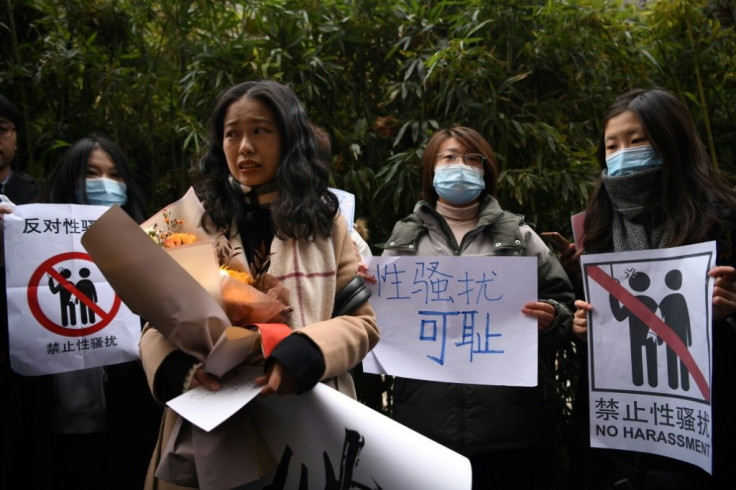China's #MeToo Movement Gets Its Moment In Court
A sexual harassment case against a powerful Chinese media figure opened in Beijing on Wednesday, with his accuser calling it a major moment in the country's still-young #MeToo movement.
Zhou Xiaoxuan, now 27, sparked a social media storm in 2018 after accusing prominent television host Zhu Jun of groping and forcibly kissing her when she was an intern at state broadcaster CCTV.
China's first-ever civil code -- passed in May -- expanded the definition of sexual harassment, but many women are still reluctant to come forward and it is rare for cases like this to make it to court.
The case was adjourned late Wednesday and the next hearing date has not been fixed yet, said Zhou, who was greeted by cheers from supporters when she emerged from court.
"I was very excited to see everyone's support but I am very tired," she told AFP after the hearing.

Earlier in the day she said the case was meaningful whether she wins or loses -- and the questions she has raised will have to be answered.
Zhou said she found herself alone in a dressing room with Zhu in 2014, and that he groped her after asking if she wanted to continue to work for the channel after her internship.
Zhu is a former host of the country's annual Spring Festival Gala -- one of the world's most-watched television shows -- and other major broadcast events.
He has denied the allegations, and launched his own court case accusing her of damaging his reputation.
There were several hundred supporters outside the court on Wednesday, some holding banners reading "#MeToo" or "We oppose sexual harassment".

One supporter, Lucy Lu, told AFP: "No matter what happens, we think she is very brave."
Zhou broke down in tears as she addressed her supporters ahead of the trial, telling them: "We may be joyous or we may run into setbacks. But please don't take my setbacks to heart.
"We have to believe that even if history repeats itself, things will definitely progress," she said.
One 26-year-old university student surnamed Huang told AFP outside the courtroom that she had also been a victim of sexual harassment.
"There is too much pressure from different facets of society and it makes you fear speaking out," she said.

But there were also violent scuffles outside the courtroom as supporters protested when police moved in, told the crowd to put down their banners, and dragged away and detained foreign reporters, including AFP.
A large crowd of supporters stayed outside the Beijing court into the evening, despite temperatures dipping below zero degrees Celsius (32 Fahrenheit).
"I think it is a very meaningful case and hope that by waiting out here, we can convey some mental support to her as well," said Anna Zhang, a 22-year-old graduate student waiting outside the court.
Zhou's case against Zhu was originally filed under the "personality rights" law -- covering rights relating to an individual's health and body -- but her lawyers have asked for it to be considered under the new legislation.
She was among a wave of people who came forward in 2018 when an emerging #MeToo movement rocked China.
When Zhou initially reported the case to police, she said she was told that speaking out would affect the image of the state broadcaster where Zhu worked and hurt the feelings of those who admired him.
"These (experiences) make you feel like your existence is very insignificant," she told AFP.
"Actual harm inflicted on your body can't even compare with the other party's illusory fame and power."
Many women are reluctant to speak out in China's conservative society where victims can also face blame.
But Zhou has no regrets about launching the case and says that even if it is unsuccessful, she hopes it will encourage more women to speak up.
"Even if I had to experience this all over again, I don't regret it. In this process I developed an emotional connection with many women and men who had similar experiences," she said.
"I think all of this is still meaningful."
Although China's #MeToo movement was restrained by online censorship and tightening state control over civil society, several well-known individuals came under fire over allegations of sexual misconduct, including the former head of the government-run Buddhist association.





















